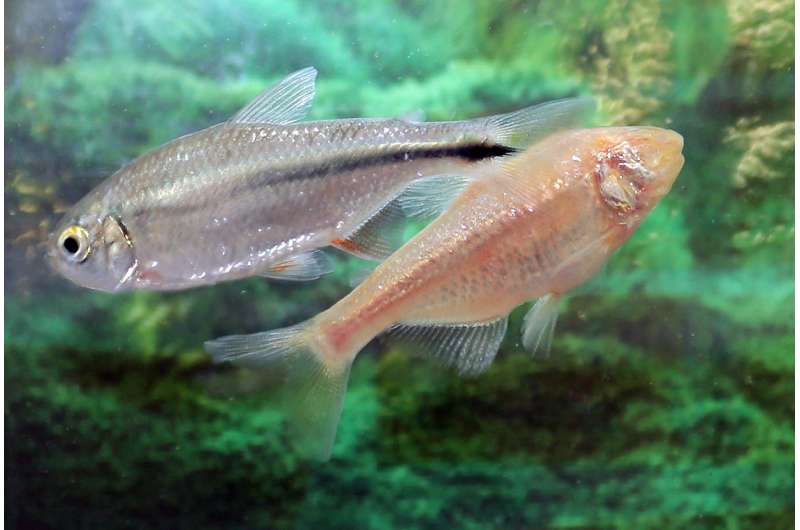A Mexican cavefish with a scarred heart

Scientists are studying a guppy-sized, blind, translucent fish that lives in the cave systems of northern Mexico to figure out why some animals can regenerate their hearts, while others just scar. Their research appears November 20 in the journal Cell Reports.
"Millions of years ago, some surface fish living in rivers flooded into caves, became trapped when river levels retreated, and lost their eyes and pigment to adapt to cave life," says co-senior author Mathilda Mommersteeg, developmental scientist at the University of Oxford. "We have discovered that, like zebrafish, the river surface fish regenerate their heart, while some cavefish cannot and form a permanent scar. We introduce the Mexican cavefish as a new model for heart regeneration research."
Mommersteeg and her team bred both surface and cavefish in the laboratory, performing surgery on some fish to remove a piece of their hearts. After surgery, surface fish slowly regenerated the missing tissue, while cavefish developed a scar. When they cross-bred the cavefish with surface fish and performed the surgery, their offspring showed differing levels of regeneration, indicating that the ability to regenerate heart tissue is heritable in these fish.
They tested the regenerative role of lrrc10, a mysterious gene unique to heart muscle that the fish shares with mice and humans, using knockout models and quantitative trait locus analysis. They found that lrrc10 and three DNA segments may play a role in heart regeneration.
"Quantitative trait locus analysis is a method that has allowed us to find out what part of all the surface fish DNA is most crucial for heart regeneration," says co-senior author Yoshiyuki Yamamoto, developmental biologist at University College London. "We have identified three regions in the DNA that contain genes that make the difference between regeneration or scarring after heart injury."
The researchers next want to find out which genes in the regions they've identified are the key regulators of heart regeneration.
"The next step is to find out what the reason is that surface fish can regenerate their hearts, but cavefish cannot," says Mommersteeg. "What is it that happened during their adaptation to cave life that stopped them from regenerating their hearts?"
More information: Cell Reports, Stockdale et al.: "Heart regeneration in the Mexican cavefish" www.cell.com/cell-reports/full … 2211-1247(18)31676-0 , DOI: 10.1016/j.celrep.2018.10.072
Journal information: Cell Reports
Provided by Cell Press





















